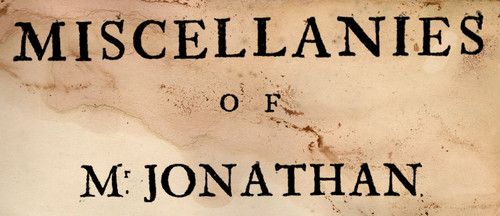
unearths some literary gems.
***
Enid called Eddie a mere barbarous mechanism and he took it pretty hard.
***
He didn't say anything; he just gave sort of a cough. That is, it was more like a muffled bark--as if he was afraid if he let himself out in a good hearty cough he might commit himself to something.
***
The worst thing in the lot, I thought--even worse than a glass hen sitting on glass eggs in a glass basket--was a great big china dog. He was lying down on kind of an oval plate, and too sizable for a mantelpiece ornament--he was kind of spanielish; but you couldn't tell what kind of a dog he was, unless being a china dog made him some kind of a dog. He had four awful-looking yellowish spots on him; but for the rest of him he was glistening bald all over, and the expression on what was intended to be his face honestly made me sort of sick. As a matter of fact, this dog was one of those things you don't want to look at but you can't help doing it. I'd look at him a while; then I'd walk away and try to forget about him; then I'd have to come back to see if he really did look as horrible as I thought he did, and then I'd just stand staring at him and swallowing.
"Isn't he wonderful?" Enid asked me.
[I'm tempted to say this one-ups Tom Travers's cow creamer--but it actually predates that particular Jeeves & Bertie novel by a couple of years.]
***
"It's got cubbyhole legs and duck feet," she said. Anyhow she said something like that; I'm pretty sure it was duck feet.
[Btw, I encountered this passage while we were vacationing with my family, shortly after we'd been talking about the word "cubbyhole" (as one does). And a bit of quick research suggests that "cubbyhole legs" are not, indeed, really a thing in antique furniture, but just something silly sounding that Tarkington made up.]
***
Usually she became a little snappish if we didn't agree with her; but how can you agree with a person when you don't know what she's talking about?
***
I was afraid she'd get nervous with me if I asked her why she'd paid three dollars and a half for "Biljor," especially as the author'd been too economical with capital letters and punctuation, I thought, to warrant any such outlay.
***
"Do you feel with Raffeeny?" Enid asked this young Carlos Prang.
"Beyond anything," he told her. "Raffeeny is inevitable. You feel inevitableness with him. It's elemental inevitableness."
***
I pointed to what seemed to be the picture of a pretty unpleasant chair with the perspective reversed. "For instance, that chair over there--if that's what it is--represents not a chair but the reaction of my nervous system to a chair? Is that it?"
She looked annoyed. "In a way, yes."
"Well, in what way?" I asked her. "Because I don't feel like that about a chair, at all. I haven't got any such nervous reaction to one, and if the person who painted it feels that way about chairs I don't feel as if I'd have any congeniality with him. I wouldn't even like him."
***
It wasn't that I expected to miss him exactly or be homesick for him, as you might say; but still a person can't break all that furniture and bric-à-brac for you to pay for and then just disappear out of your life without leaving kind of a queer emptiness somewhere behind him.
***
The noise going on inside [a club billiard room that's been invaded by rebelliously rambunctious children] was something that can't be expressed.
***
"Wait till we get our glasses filled and then tell us what you were going to say and we'll enjoy your remarks infinitively more [yes, that's "infinitively"!] and everything'll be simply delicious!"
***
Mr. Blodgett and Mr. Carmichael came out, dancing together and yet you might say not together, too, because they were holding on to each other but dancing different dances.
***
[I love how the metonymy here blossoms into all-out anthropomorphization. "The beach" refers to the local "society," i.e., the summer families who assemble daily at oceanside to gossip and be seen.]
The beach had got its own impressions so fixed in its mind that it might as well have had cotton in its ears.
***
"And now you come to me--you who--"
Well, that's all I stayed to hear; when any of my family begin to you-who at me, I generally do go.
***
He simply could not understand my not having perceived results that any schoolboy and so forth.
***
We went into Enid's room and looked at the frame she'd bought for his photograph....Enid had paid seventy dollars for that frame...and if you could forget what was in it nothing could have been more beautiful.
***
[Bonus: Dr. A. S. Folstner Gilmerding]



